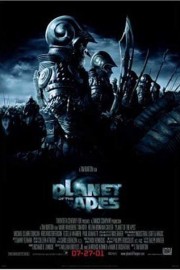Planet of the Apes (’01)
Tim Burton’s “Planet of the Apes” begins well enough. By which I mean the opening credits are pretty cool. They remind us of the opening titles of his “Batman,” with the camera teasing a larger image while Danny Elfman’s score basically goes to town. And about that Elfman score– while it doesn’t match his best work, it is a fun, contemporary riff on the experimental nature of Jerry Goldsmith’s work for the 1968 film.
From there, well, I’m not quite sure what to say. I remember there being a lot of anticipation for Burton’s “reimagining,” as it was dubbed, of the 1968 Franklin J. Schaffner classic (no one really used the term “reboot” yet), and I was one of them. Burton was a fan favorite because of his “Batman” films and three collaborations with Johnny Depp (“Edward Scissorhands,” “Ed Wood,” and “Sleepy Hollow”), and it was an interesting choice, after several false starts, to give him reign over one of 20th Century Fox most viable franchises. Seen 13 years later, it’s not surprising in the least that the film was a non-starter in getting the franchise back on it’s feet, and since that led to 2011’s “Rise of the Planet of the Apes,” and a complete re-invigoration of the material, I can’t say I’m disappointed.
“Planet of the Apes” began the current period of Burton’s career where he has been a “hired hand” on several “reimaginings” of classic films, continuing with “Charlie and the Chocolate Factory” and “Alice in Wonderland,” which was his biggest hit yet despite being a pale imitation of the classic tale. The reason for the change in Burton’s trajectory has to do, I think, with the nature of the industry moving towards established brands as opposed to original ideas, but it’s been disheartening for fans of his most personal works like “Scissorhands” and “Ed Wood.” (Hopefully, his next film, “Big Eyes,” will be a return to that type of filmmaking that will kick off a new era of originality from the director.)
But back to “Apes.” Taking it’s cues from the original novel by Pierre Boulle, the film stars Mark Wahlberg as Leo Davidson, an astronaut on a space station near Saturn that uses apes as test pilots for missions. One day, a strange anomaly occurs, and Leo’s favorite chimpanzee is sent to investigate. But he loses contact, and Davidson, against orders, goes after him. After some sort of worm hole business (or something like that), Davidson crash lands on the titular planet, and is quickly captured by the armies of General Thade (Tim Roth), leading him on a similar adventure to the one Taylor had in the 1968 film, including a sympathetic chimp (Helena Bonham Carter) that will help him along the way.
The biggest flaw in Burton’s film is that the story it tells, from a continuity standpoint, makes no sense. True, the original series twisted itself into knots with each successive entry, but in the end, they told a complete story that could be understood through the logic of science fiction and time travel. With this film, Burton and his screenwriters (William Broyles Jr., Lawrence Konner and Mark Rosenthal) really painted themselves into a corner with a final shot that was, supposedly, one of the original ideas for the end of the original film, but lacks neither the impact nor the surprise of the iconic buried Statue of Liberty. That turns the film into a one-shot riff on the original series rather than a sustainable transformation of the franchise, which is what came with “Rise” ten years later. It doesn’t help that Wahlberg lacks the natural power and charisma Charlton Heston displayed in the 1968 film, but then again, it’s in comedy where it seems like Wahlberg’s greatest strengths lie, as “The Other Guys” and “Ted” proved later on.
Narrative loopiness aside, Burton’s “Apes” has some great production values that make it work checking out. I’ve already mentioned Elfman’s score, but other artists deserve mention. The production design by Rick Heinrichs and costumes by Coleen Atwood is fantastic in creating a fully realized world where apes are atop the evolutionary chart, and humans are a lesser species (though the fact that humans can speak here, where they were mute in the original film, makes that less distinct, and the film less risky as a result). And finally, there’s the great makeup by Oscar-winner Rick Baker, which seems to act as a bridge between the groundbreaking work of John Chambers for the original series, and the remarkable, fully digital performance-capture that is bringing the apes to life now. You can always count on a rich, detailed visual experience out of a Burton film. Unfortunately, like other such Hollywood efforts from the director, the story the film tells is a largely pointless endeavor, and doesn’t feel like a personal effort from a filmmaker who, at his finest, is one of the most idiosyncratic, and engaging, visionaries in modern cinema. To quote the original film– damn you. Damn you all to Hell.










